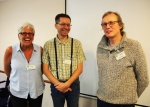Photographs and report by Paul F Abbott
Chairman to Southend beekeepers.
On the bright autumnal day that was Saturday 21 October 2017, a retinue of 100 attentive apiarists gathered expectantly in the Holiday Inn near Colchester for the annual conference and prize-giving of the Essex Beekeepers’ Association.
They were given a royal welcome by Colchester’s Divisional President and veteran beekeeper Ian Milligan. By rotation it was Colchester’s turn to host the event this year, and the theme of the day was the “Future challenges and opportunities in beekeeping”.
Three speakers of international repute had been invited to address the eager delegates who represented beekeeping divisions throughout Essex. The lecturers were Martin Benczik, Margaret Ginman, and Norman Carreck.
Colchester’s Barbara Sharp introduced the speakers and controlled proceedings with her enthusiastic flare and panache.
Martin Benczic from Nottingham Trent University spoke eloquently about his research into automated beehive condition monitoring using audio and other sensors. He described how measurements of vibrations within the beehive indicate the activity of the colony. A lively question and answer session followed.
Margaret Ginman, General Secretary of the Bee Farmers Association gave a dynamic delivery concerning the apprentice scheme which encourages young beekeepers to make a living from the craft; and the need for proper business training. She also explained current European experiences and Brexit implications. Margaret stressed that we were a nation of honey lovers, but most of the honey consumed in this country is imported. The 465 bee farmers who derive their income partly or wholly from beekeeping hope to boost productivity on the home front. As a group they continue to make a significant contribution to crop pollination and honey production.
There followed a lunch break of trophallaxis, where delegates could mingle and cross pollinate with their ideas and beekeeping aspirations.
In the afternoon the final lecture was given by Norman Carreck who is the science director at the International Bee Research Association (IBRA). His talk was entitled “Science and the Thinking Beekeeper”. He gave a concise summary of the history of scientific beekeeping research. There was an account of the various Bee research journals and textbooks available, including projects which require international cooperation. Norman described a 2014/15 study undertaken by many European countries into pollen diversity. Continued trans-European scientific research and cooperation will be essential after Brexit. This Carreck tutorial certainly kept the Essex audience of apiarists thinking deeply after lunch, and no snoring was to be heard.
Next there followed the presentation of trophies from the Essex honey show held at Orsett in September 2017. Pat Allen President of the EBKA resplendent in her official chain of office performed this duty with style. The cups and trophies were shared out fairly evenly amongst members of the Divisions who had participated in the annual honey show.
Candidates who took recent BBKA examinations were then given their certificates by Pat Allen. Over 20 people had been successful in the basic assessment in 2017. Three of these were awarded the Miss Avey prize for the highest marks. Notably Marie McCulloch of Southend Division won both an Avey citation, plus the Devall award for the novice gaining the highest total number of points in the Essex honey show. A veritable double whammy. Richard Ridler was also delighted to gain his advanced husbandry certificate which together with having completed all the modular exams of the BBKA is now recognised as a Master Beekeeper; joining his wife Jane in possessing this sought-after qualification.
Finally, the fun continued with an extensive raffle of exotic prizes. A good time was had by all attendees, and Colchester are to be praised and thanked for arranging such a splendid conference. Colchester may indeed be the oldest recorded town, and the beekeepers from that area are abundant in their mellifluous hospitality.






